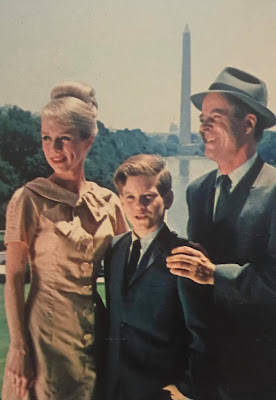 |
| Inger, Mickey Sholdar and William Windom Source: TV Guide, 1963. |
In 1963, Inger talked to friend-journalist Robert Roos for TV Guide. I've featured some of her noteworthy quotations below. Her remarks show that Inger held an interest in working with developmentally delayed children early on and that she was never afraid to question the importance of acting. Some actresses may have worried about job security or backlash from their managers and publicity folks, but not Inger. She was a straight shooter when it came to candidly discussing her career—when it came to her interracial marriage, however, she showed more caution and played coy.
In these comments, I see a woman who is a grateful, hard worker, but restlessly searching for more meaningfulness in her life. I also see a funny little jab at former boyfriend Bing Crosby! In interviews, Inger talks a lot about being "found out" to be a fraud, or, in other words, a bad actress lucking into plum roles—all the while those around her sing her praises to no end. We know that Inger was incredibly modest, but could she have truly doubted her abilities? I tend to think these comments were perhaps a defense mechanism. Inger had been disappointed so many times in her life. I wonder if she thought that if she playfully put herself down first, it wouldn't hurt so much if others criticized her later. I'm just speculating, of course, and would love to hear your thoughts on this.
Show writer Steven Gethers calls Inger an "angel" and remarks that Inger's "the best I've ever seen." Director Don Taylor elaborates:
She is as professional an actress as I've ever worked with. You give her a kernel of an idea and she comes back with the whole acorn. She's a delight. She is prepared to work, she wants to work and she is on time for work.
Still, Inger expressed doubt:
Sometimes when I'm doing a part, I think, 'My heavens, I'm not really capable of doing any of this. Some day they're going to find out I just can't do it.
On her youth:
I only knew a little English—just what I'd picked up from coloring books. I used to get terrible headaches when I was learning English. I remember the day I started thinking in English. I felt all light and airy—like I had been liberated...I did odd jobs, mostly in the garment district and looked for theater jobs during my lunch hour. But that's not a very good time because everyone is out to lunch.
On her first movie:
I never thought in a million years that I would get that part, but I went in there and just sort of did it. It scared the living daylights out of me. I'd never done a movie before—and to work in a film with Bing Crosby! My gosh or gee whiz—I can't say anything stronger because Mr. Crosby is a very religious man.
Roos notes that Inger laughed a "deep laugh and did not clarify the remark." However, Bing married Kathryn Grant shortly after his relationship with Inger. In that marriage and as he aged, Bing became stricter in his attitude and more narrow in tolerance. In fact, reading Inger's jest reminded me that Rosemary Clooney talked about this change in her autobiography Girl Singer. Rosemary wrote that "Bing had been intolerant and judgmental, as reformed playboys and quasi-alcoholics often are" and, post-1957, often lectured others on their "scandalous behavior." It must have been exasperating for Inger to see this dichotomy in Bing's character because she loathed this type of superficiality in others.
On The Farmer's Daughter:
I realize I'm lucky, but the series takes away my freedom—my freedom to come and go. I've always worked from early in the morning to late at night but now it's every week with no time off. I find I get very irritable. There are people around all the time, touching me, fixing my hair or makeup or adjusting my clothes. Sometimes I just want to go 'Awwrrrrk,' but I don't. After all, the series could run five years if it is successful. That's a lot out of a person's life.
Inger shared that although she spent most of her time working, her hobbies included playing guitar, painting, cards and going to the horse races. On acting and life, Inger shared:
I like to do things I can get completely involved in, like chess. My mind jumps around a lot, and when I can really concentrate on something, it relaxes me...I'm working so hard I feel I'm wasting time. When I lie down at the end of the road, I'll want to have left something behind—even if it is just having helped one other person. I would like to utilize myself to the best possible advantage...I think one of these days I'll stop being an actor. There is another step for me to take. I don't think you are capable at 16 of deciding what you want to do with the rest of your life. I like acting and I'm not knocking the theater. It's just that I don't know whether acting is the way I ought to spend my life...I'm interested in working with retarded children. I realize I'm not qualified now, but children are no different from other people—they're just shorter.
Inger sounds like she is considerably aware of just how fleeting time and our opportunities are in this life. She consistently brings up a fear of wasting time, of missing out on the experience of living—remarks that take on a more poignant meaning now.
Source:
Clooney, Rosemary. Girl Singer. New York, Doubleday, 1999.
Roos, Robert. "'Sometimes I Just Want to Go AWWRRRK.'" TV Guide. September 28, 1963.

No comments:
Post a Comment